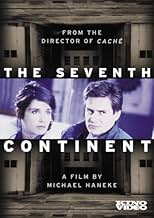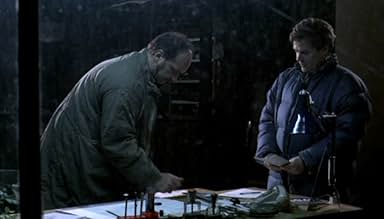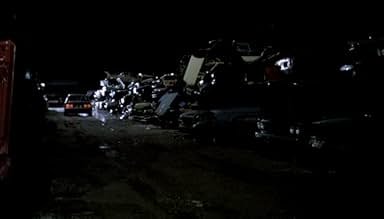NOTE IMDb
7,6/10
18 k
MA NOTE
Ajouter une intrigue dans votre langueThe daily routines of a seemingly ordinary Austrian family begin to take on a sinister complexion.The daily routines of a seemingly ordinary Austrian family begin to take on a sinister complexion.The daily routines of a seemingly ordinary Austrian family begin to take on a sinister complexion.
- Réalisation
- Scénario
- Casting principal
- Récompenses
- 2 victoires et 1 nomination au total
Jennifer Rush
- Self
- (images d'archives)
- (non crédité)
Avis à la une
I saw this movie recently and it blew my mind. The long shots, showing the mundane aspects of life. The camera aiming at the actions rather than the characters, symbolizing the every day ordeal of a conformist life. The eternal agony of a family, who slowly tears apart from everything that connects them with the world.
This is not a pleasant movie to watch. It's sad, bleak, disturbing and angry; and Haneke doesn't make it easier to the viewers. He presents life as it is, without any dramatization; and what it strikes me the most is the pace in which he presents it. The characters doesn't shout (they speak every once in a while), fight or cry their hearts out; they just keep on doing the same things they do every day. However, as you watch closer, you sense that something is completely wrong.
To me this is as an existential film as you can get. The world is there: raw, unsympathetic and indifferent. Everything happens without a reason, without hope; and the character's lack of desire to confront the nothingness of an empty life is the central theme of this movie.
"What happens when people are dead from the inside?" That's what I asked myself after watching this cold, cynical, gem of a movie. Can be someone dead from the inside and alive from the outside?. If so, could that person communicate with any other person? How can we avoid the meaningless things in life? Should we fight them back or surrender to them? Watch this movie and then you may find the answers to those questions..... or may be not. HIGHLY RECOMMENDED!. Avoid watching it if you're a bit depressed. This movie is bleak and challenging as hell.
This is not a pleasant movie to watch. It's sad, bleak, disturbing and angry; and Haneke doesn't make it easier to the viewers. He presents life as it is, without any dramatization; and what it strikes me the most is the pace in which he presents it. The characters doesn't shout (they speak every once in a while), fight or cry their hearts out; they just keep on doing the same things they do every day. However, as you watch closer, you sense that something is completely wrong.
To me this is as an existential film as you can get. The world is there: raw, unsympathetic and indifferent. Everything happens without a reason, without hope; and the character's lack of desire to confront the nothingness of an empty life is the central theme of this movie.
"What happens when people are dead from the inside?" That's what I asked myself after watching this cold, cynical, gem of a movie. Can be someone dead from the inside and alive from the outside?. If so, could that person communicate with any other person? How can we avoid the meaningless things in life? Should we fight them back or surrender to them? Watch this movie and then you may find the answers to those questions..... or may be not. HIGHLY RECOMMENDED!. Avoid watching it if you're a bit depressed. This movie is bleak and challenging as hell.
I think that many people will be able to identify with this film. As always, I made a point of knowing virtually nothing about it before I saw it, and I'd recommend doing the same. If you know about the plot beforehand, the impact will be markedly ruined. The first thought that came to mind after the first few sequences was "they haven't shown anyone's face yet".. I guess that's the point. If you are reading this, then you most likely are not starving, and are amongst the rich 1 billion of the world. So the actions portrayed initially in this middle class existence needn't any face, as they pertain to all of us, we the regurgitators of human aspirations (weird phrasing). We don't have a face, as there is nothing to tell us apart from the next person. Anyway, it's absurd to think that the mental process that took over the family is considered an exception, but the fact that it is only highlights how sick our society is, refusing to remodel this cataclysmic and decerebrate way of being. I was affected by the subsequent events that transpired, and one particular scene still haunts me in a vicious way, although it cannot be mentioned here... suffice to say it broke free from a certain degree of apathy shown by the main characters throughout, revealing the desperate and twisted cry of raw emotion that can exude from even the most planned chaos. Watch it all the way through, it is meant to bore you for a while, it wouldn't be the same if it didn't.
From my introduction to Michael Haneke through his 1997 film, Funny Games, I knew he shared an important quality with one of my favorite filmmakers. Like David Lynch, Michael Haneke doesn't care if the audience is comfortable while watching his films. Haneke extends his scenes past the point where the audience watching thinks is necessary, creating a hypnotic trance that one is unable to look away from. This ability of Haneke's to espouse the audience's attention forces the viewer to become an active participant in his films and thrusts us into an often much-needed self-examination. Haneke's feature film debut, The Seventh Continent takes an in-depth look at the lives of a family chained by the shackles of their expected existence willing to go to extreme measures to escape the monotonous confines of their daily existence.
The long takes Haneke favors throughout The Seventh Continent, introduce the audience to a young family living in Europe that live in precisely the way that is expected of them. Georg Schober (Dieter Berner) works diligently at his career, always placing himself in the best possible position to advance through promotions and better situate himself in his profession. Anna Schober (Birgit Doll), an optometrist, steadfastly maintains her family's home, dutifully completing all the tasks and errands to keep the everyday lives of her family running. Anna is also reacting to the death of a parent, which has devastated her brother, assuming the role of the strong focused sibling taxed with the burden of maintaining her parents' business. The youngest member of the family, Evi, fills her time coloring pictures, doing her homework, and occasionally causing mischief at school by feigning blindness. Neither Georg's career advancements, Anna's mourning, nor Evi's misbehavior is consequential to the story--they are simply moments that happen in each of their lives and fills their days. This is precisely Haneke's point; most of what we do in our lives are mundane activities which fill our time until we die. Whether it be a scene filmed in real time at a car wash or listening to someone relay a story during an eye exam, Haneke gives us these moments in as similar a way as they actually occur, removing all sense of grandiose filmmaking, forcing the audience to see themselves in the lives of those depicted on screen. It's hypnotizing they way we can scoff at collective suicide, yet through watching the events that lead up to the act come to understand the universality of the expectations we adhere to. Every move is repetitive, the same food is served every day at breakfast, the same pommel horse is jumped over in gym class, the same filling station is visited when the car is low on fuel. We often live our lives thinking of the future, fooling ourselves into believing that the monotony we serve daily is crucial to our growth until we are shocked to learn that the future we have been striving towards has become the past. We get so lost in the day-to-day that we need Haneke to make clear that the way we actually live our lives doesn't make all that much sense once analyzed.
The cold emotionless state maintained in the Schober home is sobering to watch. No amount of intimacy brings the family closer together. Even after making love, Georg and Anna immediately return to the distance between each other that fills their days. Not only does one hardly see any affection between the members of the Schober family, but we also rarely see them enjoy conversations with each other. The cold, detached atmosphere isn't confined to their home, either. Each time they exchange currency for a service, the audience is afforded a glimpse into the lives of everyone they interact with, each doing their job or performing a service while all vitality seems to have been drained from their being. Through the entire runtime of The Seventh Continent, we don't see a single meaningful human connection. There is even a scene in which a man recently released from his employment with Georg, returns for his things and isn't given a single embrace of encouragement or a kind word. His appearance disrupts the work because he is unexpected, further cementing Haneke's notion that our lives are simply made up of a series of repeated actions, and we are stricken by the break from routine when interrupted. Despite the lack of compassionate connectivity, I would argue that Haneke's feature is one of the most humanistic films I have recently seen, because it gives hope to our existence and alerts us to think critically about our society.
The long takes Haneke favors throughout The Seventh Continent, introduce the audience to a young family living in Europe that live in precisely the way that is expected of them. Georg Schober (Dieter Berner) works diligently at his career, always placing himself in the best possible position to advance through promotions and better situate himself in his profession. Anna Schober (Birgit Doll), an optometrist, steadfastly maintains her family's home, dutifully completing all the tasks and errands to keep the everyday lives of her family running. Anna is also reacting to the death of a parent, which has devastated her brother, assuming the role of the strong focused sibling taxed with the burden of maintaining her parents' business. The youngest member of the family, Evi, fills her time coloring pictures, doing her homework, and occasionally causing mischief at school by feigning blindness. Neither Georg's career advancements, Anna's mourning, nor Evi's misbehavior is consequential to the story--they are simply moments that happen in each of their lives and fills their days. This is precisely Haneke's point; most of what we do in our lives are mundane activities which fill our time until we die. Whether it be a scene filmed in real time at a car wash or listening to someone relay a story during an eye exam, Haneke gives us these moments in as similar a way as they actually occur, removing all sense of grandiose filmmaking, forcing the audience to see themselves in the lives of those depicted on screen. It's hypnotizing they way we can scoff at collective suicide, yet through watching the events that lead up to the act come to understand the universality of the expectations we adhere to. Every move is repetitive, the same food is served every day at breakfast, the same pommel horse is jumped over in gym class, the same filling station is visited when the car is low on fuel. We often live our lives thinking of the future, fooling ourselves into believing that the monotony we serve daily is crucial to our growth until we are shocked to learn that the future we have been striving towards has become the past. We get so lost in the day-to-day that we need Haneke to make clear that the way we actually live our lives doesn't make all that much sense once analyzed.
The cold emotionless state maintained in the Schober home is sobering to watch. No amount of intimacy brings the family closer together. Even after making love, Georg and Anna immediately return to the distance between each other that fills their days. Not only does one hardly see any affection between the members of the Schober family, but we also rarely see them enjoy conversations with each other. The cold, detached atmosphere isn't confined to their home, either. Each time they exchange currency for a service, the audience is afforded a glimpse into the lives of everyone they interact with, each doing their job or performing a service while all vitality seems to have been drained from their being. Through the entire runtime of The Seventh Continent, we don't see a single meaningful human connection. There is even a scene in which a man recently released from his employment with Georg, returns for his things and isn't given a single embrace of encouragement or a kind word. His appearance disrupts the work because he is unexpected, further cementing Haneke's notion that our lives are simply made up of a series of repeated actions, and we are stricken by the break from routine when interrupted. Despite the lack of compassionate connectivity, I would argue that Haneke's feature is one of the most humanistic films I have recently seen, because it gives hope to our existence and alerts us to think critically about our society.
Unnecessarily long and repetitive scenes intended to convey the boredom of the middle class Austrian family are undoubtedly a brilliant exhibition of cinematic art, but to me they only underline the totally unbelievable premise of the film. There was simply no reason for this family to be in despair: the man had a good white collar job and was recognized by his employer, the wife had a responsible entrepreneurial position and the daughter, while sometimes bizarre, was hardly a reason for her parents' perceived hopelessness. A man and a wife who are able to function effectively in every day life for the period of the film, three years, with no apparent psychoses, are not likely to engage in the incredible acts leading to the dramatic climax. The technical aspects of the film were interesting: short scenes, some without apparent relevance (the daughter's itch) with relatively long pauses between; the acting was a bit mechanical, sort of robotic, but that was undoubtedly intentional to convey the nihilistic mood of the protagonists. I didn't think the movie was worth watching, but most critics disagree, so if you enjoy this type of movie, then it is definitely for you.
A powerful, disturbing film, shot in a highly idiosyncratic style. Michael Haneke's dissection of Austrian alienation is astonishingly effective. The style is, for the first part of the film, full of such close-ups that we don't see the characters' faces for nearly half an hour, but we share with them their view of the breakfast cereals, shoes and shopping. It should be boring, but is instead gripping, a quiet build-up to the prosaic horrors to come.
It is hard to comment without revealing some of these horrors, but the overall effect is shattering, tolerable only because Haneke avoids any real involvement with the characters and their motivations. With hindsight this is a weakness, and I reached the end of the film with the feeling 'what was that all about?'. But it is a film to reflect on, unlike any other that I have seen. Don't miss it - unless you are feeling depressed!
It is hard to comment without revealing some of these horrors, but the overall effect is shattering, tolerable only because Haneke avoids any real involvement with the characters and their motivations. With hindsight this is a weakness, and I reached the end of the film with the feeling 'what was that all about?'. But it is a film to reflect on, unlike any other that I have seen. Don't miss it - unless you are feeling depressed!
Le saviez-vous
- AnecdotesBased on real events.
- Citations
Georg Schober: We have to cancel the newspaper subscription
Anna Schober: Mhm
- ConnexionsFeatured in Selección TCM: Michael Haneke (2012)
- Bandes originalesSend Me Roses
(uncredited)
Written by Günter Mokesch and Karin Raab
Performed by Günter Mokesch and Karin Raab
Meilleurs choix
Connectez-vous pour évaluer et suivre la liste de favoris afin de recevoir des recommandations personnalisées
- How long is The Seventh Continent?Alimenté par Alexa
Détails
Box-office
- Montant brut mondial
- 428 $US
Contribuer à cette page
Suggérer une modification ou ajouter du contenu manquant


























